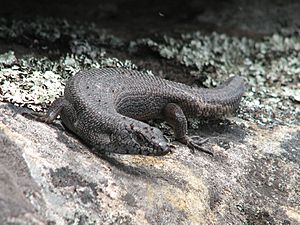Black rock skink facts for kids
Quick facts for kids Black rock skink |
|
|---|---|
 |
|
| Conservation status | |
| Scientific classification | |
| Genus: |
Egernia
|
| Species: |
saxatilis
|
The black rock skink (Egernia saxatilis) is a fascinating type of skink, which is a common kind of lizard. It's also known as the black crevice-skink because it loves to live in rocky cracks. These skinks can grow to about 13.5 centimeters long, not counting their tail! They belong to the family called Scincidae.
Contents
Where Do Black Rock Skinks Live?
These special skinks are found in the southeastern part of Australia. You'll mostly see them along the coast and in nearby mountain ranges.
There are two main groups, or subspecies, of the black rock skink:
- Egernia saxatilis saxatilis: This group lives in the Warrumbungle mountains in New South Wales.
- Egernia saxatilis intermedia: This group lives in all the other areas where black rock skinks are found.
What Do Black Rock Skinks Do?
Black rock skinks are active during the day, which means they are diurnal. They spend their time looking for food and exploring.
What Do They Eat?
These skinks mainly eat small insects. But sometimes, especially during certain seasons, they also munch on plants.
Where Do They Live?
Black rock skinks love to live in the cracks and spaces found in rock outcrops. They usually stay close to these safe spots.
How Do They Behave?
You'll find black rock skinks are most active when the weather is warm. They often interact with each other, showing complex social behaviors. They can even be a bit aggressive if another skink tries to enter their territory.
Family Life
Unlike many other reptiles, black rock skinks often show "monogamous" tendencies. This means a male and female might stay together as a pair.
Adult skinks and their young can live together for more than a year. The female skink usually gives birth to 2 or 3 live young each year. This is called being viviparous, meaning they don't lay eggs.
Scientists believe these skinks can live for about 10 years. They become adults and can have their own young when they are about 2 to 3 years old.
Are Black Rock Skinks Safe?
Even though you might find many black rock skinks in certain areas, their overall numbers seem to be going down. Also, the places where they live are becoming separated.
Experts in New South Wales have looked into how threatened this species is. They suggested more studies are needed because the population is declining. This helps make sure we can protect these interesting lizards for the future.
See also
 In Spanish: Egernia saxatilis para niños
In Spanish: Egernia saxatilis para niños


